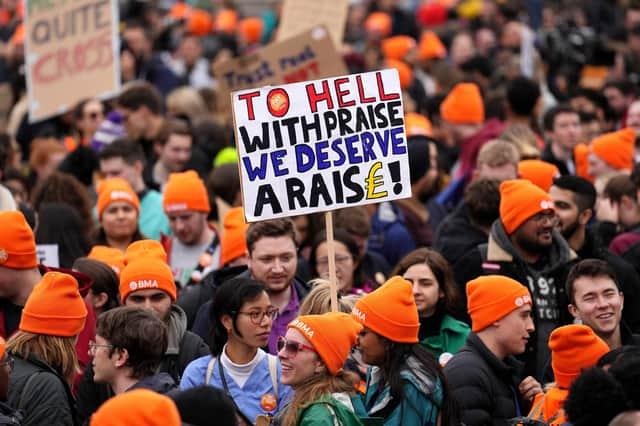Junior doctors' strike: Scottish Government meets with union reps in bid to avoid NHS walkouts


Yesterday, junior doctors in England began a four-day strike over pay, which is expected to lead to 350,000 appointments - including operations - being cancelled south of the border.
Juniors in Scotland are yet to set a date for strike action, with the ballot still being open.
Advertisement
Hide AdAdvertisement
Hide AdScottish junior medics have until Friday, May 5, to decide whether the BMA - which is representing junior doctors in the pay disputes with both the Scottish and UK Governments - should conduct industrial action.
The chair of the BMA’s Scottish junior doctor committee, Dr Chris Smith, said the Scottish Government has “repeatedly failed to meet our demands for pay negotiations”, and described the current offer of a 4.5 per cent uplift as “derisory”, as they received in 2022/23.
“This was, in reality, a massive pay cut,” said Dr Smith, “or the equivalent of working three and a half weeks for free this year compared to last.
“And this is on top of the pay erosion experienced which means a foundation doctor earns 23.5 per cent, less than they would have done in 2008 – a figure which is even higher for registrars.”
From 7am yesterday, doctors in England have mounted protests outside of hospitals, and plan to continue until Saturday morning.
Although the true impact of the strike will only be known once statistics are released in at least a weeks’ time, the chief executive of the NHS Confederation, Matthew Taylor, said the likely impact of the strike was “heartbreaking” and called on both sides to end their “battle of rhetoric”.
Mr Taylor said the strike would be more disruptive than the 72-hour stoppages by NHS staff last month, which led to 175,000 cancelled appointments.
The BMA in England says it wants "pay restoration" to 2008 levels - equivalent to a 35 per cent pay rise.
Advertisement
Hide AdAdvertisement
Hide AdDr Sumi Manirajan, deputy co-chair of the BMA’s junior doctor committee said she "can't guarantee that no lives will be put at risk this week - but that's because lives are being put at risk every single week".
“I can’t guarantee that no lives will be put at risk but what I can guarantee is that 500 patients are dying (every week) waiting for care at the moment.
“What I can guarantee is that emergency care, essential care will be provided by expert clinicians in hospitals.
“So what I’m saying is that, no, I can’t guarantee that no life will be at risk this week. But that’s because lives are being put at risk every single week.”
Dr Manirajan added that "expert doctors" who are not usually in hospitals will take the place of junior doctors who are out on picket lines.
Meanwhile, the UK health secretary Steve Barclay has accused junior doctors of taking a "militant stance" and timing the four-day strike "maximum disruption" for patients.
Writing in the Telegraph, Mr Barclay said the strike poses a "considerable risk to patient safety", and claimed the BMA’s demands for a 35 per cent pay rise would add up to £20,000 a year to their current salaries.
Comments
Want to join the conversation? Please or to comment on this article.